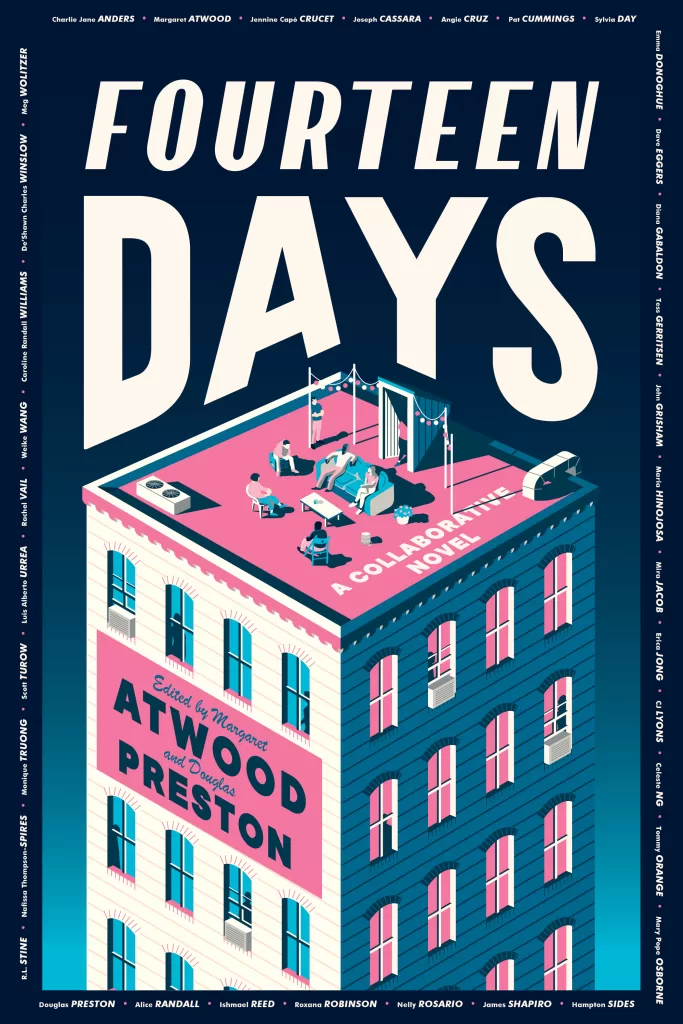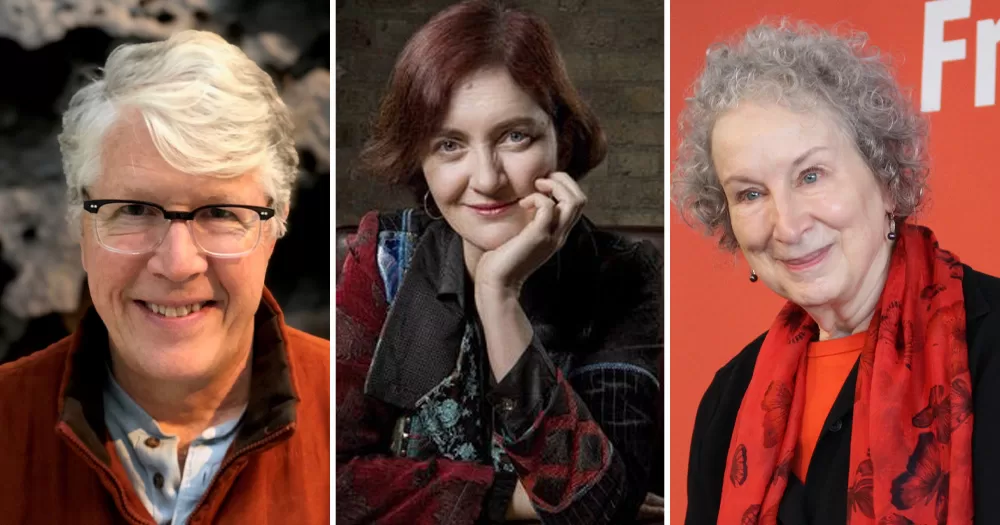36 writers have joined forces to create a collaborative new novel to fight book bans and library closures in the US, while also promoting freedom of expression. Entitled Fourteen Days, the project is being published by HarperCollins on February 6, with proceeds going towards the Authors Guild Foundation.
The book is edited by Margaret Atwood and Douglas Preston, who have also co-written it alongside the likes of Irish lesbian superstar Emma Donoghue, as well as John Grisham, Erica Jong, Diana Gabaldon, R.L. Stine, Dave Eggers, Tess Gerritsen, Meg Wolitzer and Scott Turow. It is set during the early days of the Covid-19 pandemic, in a locked-down New York apartment building where tenants gather to tell each other stories to pass the time. The contributing authors give these characters their tales which span romance, thriller, nonfiction, poetry and more, with the unique collaborative element solidifying the book as the first of a new literary genre.
Ahead of its release, GCN spoke to Douglas Preston about the project.
What can readers expect from Fourteen Days?
Fourteen Days is a strange and wonderful novel like no other, a collaboration written by 36 incredible literary talents, that will keep the reader turning the pages until the astonishing revelation at the end.
It is the story of a group of New Yorkers, under lockdown in a shabby building during the pandemic, who gather on the rooftop every night to cheer on the first responders. Eventually, they begin telling each other stories about their lives before COVID-19, their loves, tragedies, and confessions, stories about ghosts and hauntings, magic and murder.
Why is this book so unique?
I’m not aware of another book in which such a remarkable and diverse group of literary luminaries have come together to collaborate. These are writers from all genres and backgrounds, from huge bestselling authors like John Grisham and Diana Gabaldon, to unique literary voices like Tommy Orange and Margaret Atwood, to poets like Ishmael Reed, journalists like Maria Hinojosa, and nonfiction authors like Hampton Sides.
Tell us about your contribution to the book, and some of your favourite characters.
I wrote the frame narrative—that is, I wrote the story in which all the stories are embedded. The frame narrative—the stories within a story—is a literary device not unlike what you see in the Decameron or A Thousand and One Nights.
I created the primary storyteller, the building’s super, a gay woman named Yessie, as well as some of the characters who tell the stories. Many contributors also invented characters to tell stories, including Margaret Atwood, who has a predatory spider on the rooftop tell her story.
Why is it important for you to support the Authors Guild Foundation?
The Authors Guild is America’s oldest and largest association of professional authors. All the proceeds of the book are going to support the Authors Guild’s efforts to fight book banning, protect free expression and authors’ rights, and support a diversity of voices in our literary culture.
Why are book bans a pressing issue?
The fundamental purpose of books in our society is to transmit values across generations and tell us who we are. Books serve an especially important role in the lives of young people, helping them explore their world, establish their identities, and find acceptance and affirmation.
The book banning movement in the US has focused, perniciously, on LGBTQ+ books. It thus deprives many young people of reading about people like themselves, who might be struggling with the same issues they are. Book banning attacks the very existence of people who are gay or queer, denies LGBTQ+ identity, and broadcasts ugly, non-American values of intolerance and exclusion—exactly the opposite of what books should do.
Nobody is forcing anyone to read a book. People have a fundamental right to choose what to read and not read. Book banning is an attempt by a small minority of mostly religious people to control what everyone else reads; it is an attempt to take away freedom of choice and impose a narrow, retrograde viewpoint on everyone else.

Fourteen Days releases on February 6, but if you can’t wait until then, pre-order it now!
© 2024 GCN (Gay Community News). All rights reserved.
Support GCN
GCN is a free, vital resource for Ireland’s LGBTQ+ community since 1988.
GCN is a trading name of National LGBT Federation CLG, a registered charity - Charity Number: 20034580.
GCN relies on the generous support of the community and allies to sustain the crucial work that we do. Producing GCN is costly, and, in an industry which has been hugely impacted by rising costs, we need your support to help sustain and grow this vital resource.
Supporting GCN for as little as €1.99 per month will help us continue our work as Ireland’s free, independent LGBTQ+ media.
